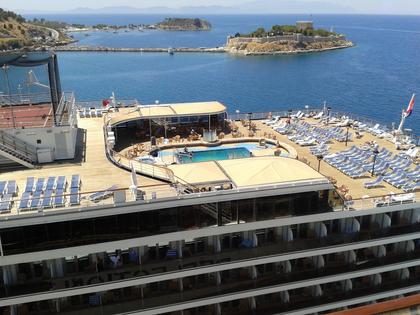Taking the Kids: It’s easy to travel more sustainably
Who really needs clean towels and sheets every day on vacation? Ditto for super-long showers.
“The amount of energy and water that travelers use negatively impacts locals far more than they realize,” said Max Shak, founder of SurvivalGearShack.com. “Check with your hotel about how they conserve water and what you can do to minimize your impact.”
Better yet, consider hotels that are actively working to operate more sustainably like the Loews Regency New York (water reduction and temperature adjustments when guests are out of their rooms). The LEED-Certified Kimpton Hotel Palomar in Philadelphia and the Radisson Blu Mall of America in Minnesota are among those partnering with Clean the World. Their unused portions of bar soaps are recycled for kits sent to impoverished communities.
The YMCA of the Rockies in Colorado boasts a solar farm, new electrical vehicle chargers, and has begun to put a “Wrap on Plastic Wrap,” purchasing reusable options for towels and linens.
Cruise lines, including Holland America Line, are eliminating single-use plastic bottles and seeking more sustainable fuel options. Hurtigruten has debuted its second battery hybrid cruise ship while Royal Caribbean has announced a Destination Net Zero strategy to achieve net-zero emissions
“A large number of hotels are actually committing themselves to being more sustainable through efforts like reducing or eliminating plastic waste. Even with these efforts in place, their price typically doesn’t go up, making them a viable option for most travelers. By intentionally choosing to stay at these kinds of hotels, you are supporting sustainable efforts, being more sustainable yourself, and not going out of budget,” suggests Nick Mueller, director of Operations for Hawaiianislands.com.
That seems especially true in Hawaii. Alohilani Resort Waikiki Beach on Oahu announced last month that it is on track to become the first carbon neutral hotel in the state of Hawaii. The resort is now powered by 100 percent renewable electricity, has pledged to plant 100,000 indigenous trees with the Hawaii Legacy Reforestation Initiative and has introduced a sustainable food and cocktail happy hour series centered on locally sourced products.
The newly renovated Turtle Bay Resort on Oahu’s North Shore has a 469-acre on-site Kulima Farm that provides local produce not only to the resort but surrounding communities. Guests are invited to visit and even pick their own ingredients.
On Kauai, Hanalei Colony Resort, where the suites have kitchens, is gifting guests new reusable shopping bags with a guide to the island's farmer's markets, farms and roadside stands. This is to encourage guests to buy local and make conscious commerce the part of their visit to Kauai.
Certainly, shopping and eating locally, using public transportation — or traveling by bike or on foot —can all support sustainability efforts and local economies.
“Locally-owned businesses tend to source their labor and supplies more locally compared to massive chain stores. Not only that, but the vast majority of the money you spend with these businesses stays in the local community through local tax dollars,” explains Tim White, founder of MilePro.com.
Consider a water bottle with a water purifier filter so you can drink water safely wherever you go. One Water-to-Go water purifier bottle filter replaces 400 single use plastic bottles. ($35.99). For every LifeStraw product purchased, a child in need receives safe water for an entire year. (Squeeze bottles with a filter start at $32.95.)
Air travel comes with a big carbon footprint. Consider purchasing carbon offsets from Terrapass. The purchase funds projects to reduce carbon emissions and provide more green jobs.
The Coral Reef Alliance created a sustainable travel guide with some simple steps you can take to reduce your carbon footprint. Obviously, reuse towels and sheets to conserve energy and water, shut off lights, heat and AC when not needed. Take shorter showers and avoid single-use plastics. Use reef-safe sunscreens that don’t contain oxybenzone, octinoxate or octoctrylene that harm coral reefs. Look for “marine safe” logo.
Aqua-Aston Hospitality in Hawaii helped pass the world’s first sunscreen law banning chemicals commonly used in sunscreen. The resort company’s #ForOurReef campaign aims to educate guests and has now partnered with Little Hands Hawaii, a mom-owned reef-safe sunscreen company.
Perhaps the pandemic was the tipping point for travelers wanting to travel more sustainably, suggests research from Booking.com, 83 percent of global travelers surveyed think sustainable travel is vital, with 61 percent saying the pandemic has made them want to travel more sustainably in the future.
More than half (55 percent) of global travelers are planning to take slower modes of transport to reduce their environmental impact in 2022. Additionally, three quarters (76 percent) of global travelers will choose a place to stay if it has good sustainability accreditation.
To that end, Booking.com has introduced a new Travel Sustainable badge, helping to connect properties that have implemented a combination of independently verified sustainable practices. It is a first of its kind and it is designed to help travelers find more sustainable options.
The platform lists six of the world’s best cities for more sustainable travel, including New York, (easy to walk or take the subway!) and Copenhagen (bike everywhere).
The city of San Luis Obispo (SLO), California, has launched Keys for Trees, an initiative that aims to plant 10,000 trees by 2035 – the same year this California Central Coast town will become carbon neutral. Every time a hotel room is booked, the funds to plant new trees continue to blossom
Costa Rica and Belize have long championed eco-tourism and resorts that have pioneered sustainability initiatives. Like Chaa Creek, which we recently visited and was the first Green Globe Certified resort in the country.
Belize is phasing out all single-use plastics, has banned offshore drilling and after a decade of effort, the Belize Barrier Reef, the largest in the northern hemisphere, is being removed from the danger list. Nice work!
Happy (sustainable) travel!
========
(For more Taking the Kids, visit www.takingthekids.com and also follow TakingTheKids on Twitter, Facebook and Instagram where Eileen Ogintz welcomes your questions and comments. The Kid’s Guide to Philadelphia and The Kid’s Guide to Camping are the latest in a series of 14 books for kid travelers published by Eileen.)
©2022 Eileen Ogintz. Distributed by Tribune Content Agency, LLC.
(c) 2022 DISTRIBUTED BY TRIBUNE MEDIA SERVICES, INC.
















Comments